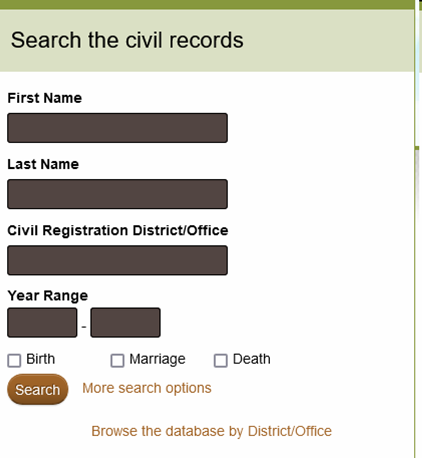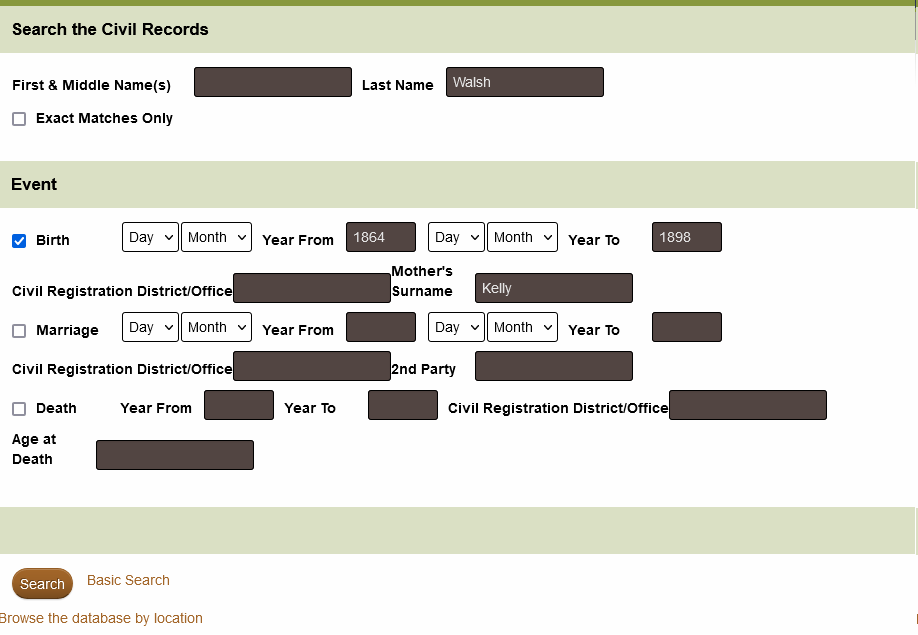 IrishGenealogy’s civil records section is the greatest thing since sliced bread. Almost single-handedly, it has revolutionised Irish family history research. By making almost 16 million births, marriages and deaths open and free, it also enabled whole fields of research – into infant mortality, townland history, occupational history – that had been closed books. So all hail IrishGenealogy.
IrishGenealogy’s civil records section is the greatest thing since sliced bread. Almost single-handedly, it has revolutionised Irish family history research. By making almost 16 million births, marriages and deaths open and free, it also enabled whole fields of research – into infant mortality, townland history, occupational history – that had been closed books. So all hail IrishGenealogy.
Except (there had to be an “except”) … over the years, I’ve regularly noticed peculiarities in the site’s search results: the same search parameters sometimes bring back different results or the results include many more records than expected.
So, in the same spirit of enquiry that led me to dismantle Santa’s 1959 gift of a wonderful toy Winchester, I went down the rabbit-hole that is the IG search interface. Be warned. This gets geeky.
 First the simple search: Enter a first name and a last name here and the site will search its forename records (and all forename variants) for that first name and search its surname records (and all surname variants) for the last name.
First the simple search: Enter a first name and a last name here and the site will search its forename records (and all forename variants) for that first name and search its surname records (and all surname variants) for the last name.  But there is no way here to turn off the variant search. So entering “Jeremiah”, always also finds Darby and Jerry and Gerard and Gerald, entering Smith always also finds Smyth, Smythe, Smithe ….
But there is no way here to turn off the variant search. So entering “Jeremiah”, always also finds Darby and Jerry and Gerard and Gerald, entering Smith always also finds Smyth, Smythe, Smithe ….
In addition, for births after 1899, where the record includes the mother’s maiden surname, that surname and its variants are also searched. So a search for any “Sadler” born in 1900 also returns all births where the mother’s name is Sadler or Sadlier or Sadleir … There is no way to confine the search to the child’s surname only.
The innocuous-sounding “More Search Options” is even more complex, especially when searching on two names.  The crucial distinction to keep in mind is between the names entered at the top of the page and any other names you enter for mother’s maiden name or spouse.
The crucial distinction to keep in mind is between the names entered at the top of the page and any other names you enter for mother’s maiden name or spouse.
First, like the simple search, the main forename and surname boxes search only forenames and surnames. And again, for births the mother’s maiden name is always searched. Here you can turn off variants by ticking the “exact match” box, but this won’t turn off the mother’s maiden name search. So we have actually no way on the site to search just for a child’s birth surname.
The most important quirk in the “More” area is that variants are only ever applied to the main surname, not any other names you enter. So searching for a Walsh with mother’s maiden name Burke (after 1899) will find all Walsh/Welsh/Walch children with mother’s name spelt exactly “Burke”. No Bourk or Bourke or De Burca mothers.
This can be especially tricky with marriage searches. Again, variants are only applied to the two main names, not anything you enter in the “2nd Party” box. Search for a Derby Moriarty who married a McElligot and you’ll get all variants of Derby and all variants of Moriarty but only the exact spelling of McElligot. And I count at least 13 variant spellings of McElligot in the marriage records.
Because IG marriages cover more than a century, and because marriage records are the most useful of the BMD trifecta, the moral is clear: always reverse names and do a second marriage search, whether or not you think you’ve found what you want.
Finally, remember that wild cards are always usable in all the name boxes in the “More” area.
Enough? I could go on … if you really want more, here’s a YouTube with lots of examples.
And I never got the wonderful Winchester to work again. Another moral there.
I’ve been researching a surname and found it never varied the spelling, I’ve had to do in manually. When the surname is “Pujolas” – I’ve found that every vowel has been used in place of another at some stage and the J replaced with G. Wild card seems to turn off in this instance..and I thinking I’d be given a parade for having results back so quickly. Another moral there!
Nice post. I always do the double search as outlined above. Any idea what proportion of records (from the twentieth century, not earlier) have been lost, mislaid, destroyed etc.? I have come up against an absolute brick wall for one family who had five children but none of the births are on the civil record, neither is the marriage. Despite being married by 1911 the couple seem to be absent from the census, too. So the mothers maiden name is not available and this seems to be a pre-requisite for trying to get birth certs for the five children. They were in Ireland also, for sure, so not in the UK. Thus far baptismal records in several parishes where they lived are non-existent too!
I had noticed these peculiarities too, especially when searching on the more advanced page. Reversing the search terms is the best way to hit all results.
The biggest quirk I found was that search years are based on registration date, which tended to be 2-3 weeks later, so end of year events ended up in the following year. While it’s something you learn with experience, it’s not made clear to beginners, and certainly caused me initial confusion.
Another quirk is that when you use the advanced search, it is not made clear that putting in all details for the extra fields only works for records which have those fields digitised for searching, and getting back blank results when you know they must exist is frustrating.
In both cases, a simple explanation at the top would help.
Hi John, you should bring the remaining parts of your toy Winchester rifle to The Repair Shop programme on BBC and they would be able to fix it up for you!?
Last Name Odonovan
Born in County Cork
Can’t find my name anywhere in Cork